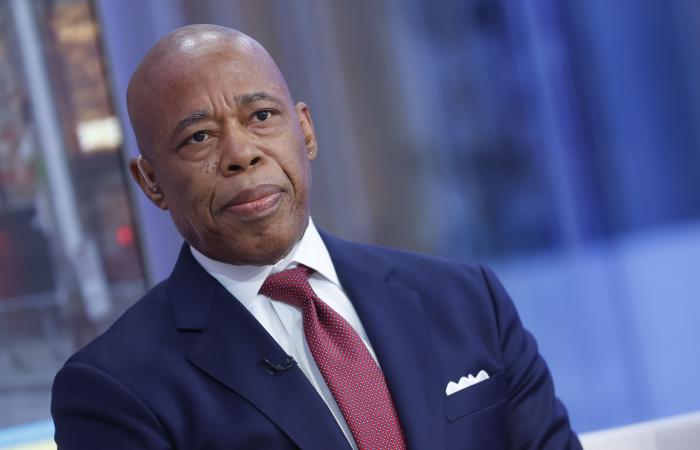
The judge overseeing the Eric Adams corruption and bribery case is indefinitely postponing a trial scheduled for April, but has not ruled yet on whether he will sign off on the Department of Justice's motion to dismiss the case with prejudice, according to a new order filed Friday.
U.S. District Judge Dale E. Ho has been weighing a Justice Department request to dismiss the criminal case against Adams, which includes charges of conspiracy, wire fraud soliciting illegal campaign contributions and soliciting and accepting a bribe.
In his order Friday, Ho said since Adams' defense is supportive of the DOJ's motion, there is "no adversarial testing of the Government's position." As a result, the judge appointed Paul Clement, of Clement & Murphy PLLC to present arguments as amicus curiae, or an independent attorney to argue on behalf of third parties.
Ho has asked Adams' attorneys, the DOJ's attorneys and Clement to address the standard to dismiss an indict, what the court can consider, whether any additional steps will be required, if the dismissal should be with or without prejudice, and several other considerations.
The judge said the parties should submit briefs by March 7 and a hearing may be convened on March 14 at 2 p.m.
Ho said he plans to rule promptly after the briefs are submitted, but by removing the April 21 trial date, it removes any possible prejudice in the proceedings.
"The Court reiterates that it understands the importance of prompt resolution of the pending motion and will endeavor to rule expeditiously after briefing (and, if necessary, oral argument) is complete. The adjournment of trial and all related deadlines alleviates any prejudice resulting from a short delay," Ho said in his ruling.
Adams testified under oath at a hearing Wednesday on the Justice Department's request, insisting there was no quid pro quo arrangement to shelve his criminal case. But a lawyer for the government argued that dropping the case was necessary to ensure Adams could aid President Donald Trump's immigration crackdown — a highly unusual rationale that has reinforced concerns that the mayor is now beholden to the Republican administration.
Acting Deputy U.S. Attorney General Emil Bove argued that the Justice Department is simply exercising “prosecutorial discretion” based on a Trump executive order that aims to end the “weaponization of prosecutorial power.”
Bove, the department’s second-in-command, said the charges are impeding Adams’ ability to govern and his campaign for a second term. Dropping the case, he said, is necessary to ensure Adams can assist in the Republican president's national security and immigration enforcement initiatives.
The Justice Department is seeking the option to revive the case at a later date, and Bove has said the new, permanent Manhattan U.S. attorney will review the matter after the November election.
Adams has pleaded not guilty and denies wrongdoing.
Former New York City Mayor Bill de Blasio weighs in on Gov. Kathy Hochul putting in guardrails on Mayor Eric Adams amid controversies surrounding his bribery and corruption case and his relationship with the Trump administration.
Seven prosecutors have resigned in protest, including Manhattan's top federal prosecutor, who quit rather than follow Bove's directive to drop the case.
Interim U.S. Attorney Danielle Sassoon, a Republican, accused Adams’ lawyers of offering a “quid pro quo” on immigration and said it's “a breathtaking and dangerous precedent" to reward Adams for his “opportunistic and shifting commitments on immigration and other policy matters.”
Another prosecutor, Hagan Scotten, wrote in his resignation letter: “No system of ordered liberty can allow the Government to use the carrot of dismissing charges, or the stick of threatening to bring them again, to induce an elected official to support its policy objectives.”
Three former U.S. attorneys — from New York, Connecticut and New Jersey — submitted a letter urging Ho to “hear from parties other than the government and the defendant in deciding about the appropriate next steps.”
Separately, a former Watergate prosecutor has filed papers asking Ho to reject the dismissal request and consider appointing an independent special prosecutor to try the case.





